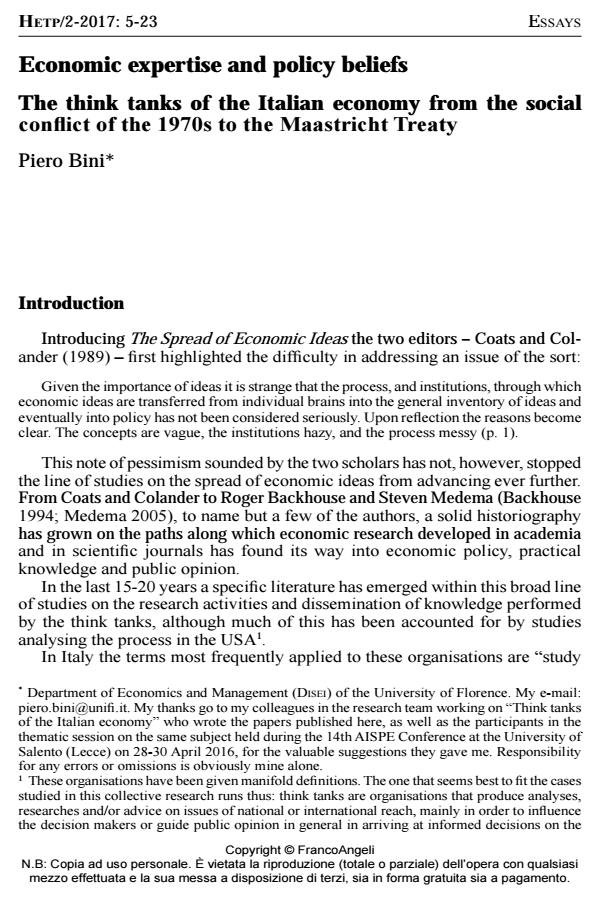Economic expertise and policy beliefs - The think tanks of the Italian economy from the social conflict of the 1970s to the Maastricht Treaty
Titolo Rivista HISTORY OF ECONOMIC THOUGHT AND POLICY
Autori/Curatori Piero Bini
Anno di pubblicazione 2017 Fascicolo 2017/2
Lingua Inglese Numero pagine 19 P. 5-23 Dimensione file 276 KB
DOI 10.3280/SPE2017-002001
Il DOI è il codice a barre della proprietà intellettuale: per saperne di più
clicca qui
Qui sotto puoi vedere in anteprima la prima pagina di questo articolo.
Se questo articolo ti interessa, lo puoi acquistare (e scaricare in formato pdf) seguendo le facili indicazioni per acquistare il download credit. Acquista Download Credits per scaricare questo Articolo in formato PDF

FrancoAngeli è membro della Publishers International Linking Association, Inc (PILA), associazione indipendente e non profit per facilitare (attraverso i servizi tecnologici implementati da CrossRef.org) l’accesso degli studiosi ai contenuti digitali nelle pubblicazioni professionali e scientifiche.
This paper explores the activities of five think tanks at work on the Italian economy during the 1970s and 1980s. They are: Cespe (Economic Policy Research Centre) and Csc (the research departement of the Confederation of Italian Industries) in the second half of the 1970s; Ceep (Economic Policy Study Center) from 1973 to 1992; Cer (Research Europe Center) from 1981 to 1992; Isel (Labour Economic Studies Institute) from 1981 to 1985. Based on the experience of these study centres, the paper considers some leading topics in the think tank’s literature, such as 1) the relationship between knowledge and power; 2) the challenging and problematic path between the economic expertise and the aspiration to influence the policy-making. In particular, the study-cases analysed show a variety of nexus between knowledge and policy, in some cases of a conflictual nature, in others of a dialectical nature, and in yet others legitimising one another. As a consequence of this focus on these 5 think tanks, some major issues of the Italian economy of that time are also brought to the attention of the reader: the ways then adopted to escape from inflation; the inability of the ruling powers to address the crisis of public finance and the soaring public debt; and the great uncertainty about the effectiveness of the quantitative parameters of the Maastricht Treaty in providing an appropriate solution for Italy. In general, the paper provides some reflections on the different guises in which economics seeks a place in public discourse.
Parole chiave:Italian economic thought in the 1970s and 1980s, Think tanks, From economists to policymakers, Industrial relations, National Budget, Deficit, and Debt.
Jel codes:B2, D7, E65, H6, Z18
- Selective Neoliberalism: How Italy Went from Dualization to Liberalisation in Labour Market and Pension Reforms Emanuele Ferragina, Alessandro Arrigoni, in New Political Economy /2021 pp.964
DOI: 10.1080/13563467.2020.1865898 - An intellectual boost for Italy’s Europeanisation: the contribution of the influential think tanks Arel and Nomisma (1978–1993) Luca Sandonà, in The European Journal of the History of Economic Thought /2021 pp.324
DOI: 10.1080/09672567.2020.1817118 - The social and political bases of political economy: interpreting and periodising Italian developments since WWII Emanuele Ferragina, Alessandro Arrigoni, in New Political Economy /2024 pp.770
DOI: 10.1080/13563467.2024.2344854
Piero Bini, Economic expertise and policy beliefs - The think tanks of the Italian economy from the social conflict of the 1970s to the Maastricht Treaty in "HISTORY OF ECONOMIC THOUGHT AND POLICY" 2/2017, pp 5-23, DOI: 10.3280/SPE2017-002001